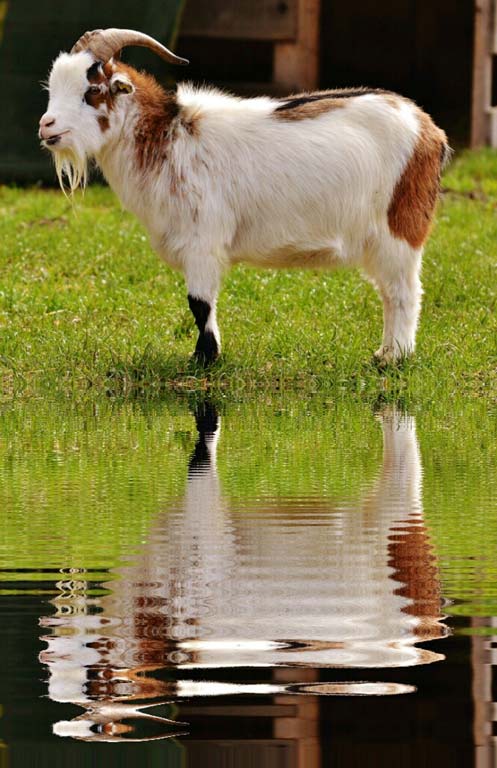Did you know that goats can swim? Yes, you read that right. Goats can swim if the situation asks for it. Since you do not see them often in the waters, it might be difficult to believe, but read on to find out more about this amazing fact about goats.
Can All Goats Swim?
Swimming is an ability that goats inherit from their ancestors, and they have in them the skill for swimming from birth. While wild goats put their ability to use in their daily life in the wild, domesticated and pet goats lack their expertise in the field due to lack of exposure.
Since domesticated goats are provided with everything from food to shelter by their owners, these goats do not get a chance to explore their opportunities and lag behind their relatives in this aspect. The less acquaintance with water even makes them afraid of water, as can be seen in the reaction of some goats when water is sprinkled upon them.
How did Goats Learn to Swim?
Swimming, like many other skills, develops from the dire need for it and with evolution, gets carried on to the generations that follow. Likewise, swimming is an essential survival skill that wild goats possess. Goats can swim with a doggy paddle and are pretty fast swimmers. Wild goats especially are strong swimmers, who must have developed their skills reaching across rivers and streams searching for food, shelter, and to populate the land masses that lie across water bodies.
Are Goats Fond of Water and Swimming?
The fact that goats can swim does not mean that they are very fond of it. Most goats, especially the domesticated ones, do not have the proper muscle strength or stamina to go on swimming. Since their bodies are also not meant for swimming but rather climbing and running, their coat does not dry quickly and could also make them feel cold.
Miniature and dairy goats are the ones who could be said to detest water. They do not even seem to like the rain, because getting their hooves wet makes them prone to slip and fall. These small goats, who usually become prey to predators, find such situations alarming since, if they fall, they are more at risk of getting killed.
Other domestic goats who are well protected from predators could be introduced to the water by their owners and make them overcome these fears. They can doggy paddle once put in water, which came down to them from their ancestors. Once they get the hang of it, you can even find some of them loving the water and jumping in whenever they find a chance to swim.
Can Goats Swim in Pools?
The idea of you and your goat swimming happily in a pool must be thrilling to think of. As exciting as it sounds, you must be cautious about certain things before making this dream a reality. Even if you train your goat to love water, always keep in mind that their bodies are not made for water and hence take the necessary measures to avoid any bad outcomes.
If you are planning to swim in an artificial pool with your goat, the water will contain chlorine, which is harmful to goats as it is to humans. And since they cannot be told, and made not to drink the pool water, their drinking the water could also make them sick. Diarrhea and dehydration are seen in goats as a result of consuming water containing chlorine.
Goats’ bodies are not suitable for water, which results in them retaining the wetness and not drying up quickly. So, only let your goats go for a swim when it is sunny and dry out there when the temperatures are not too low. If the temperature is below 75 Fahrenheit, do not let your goat in the water since it can be lethal for them.
Goats are naturally scared of getting their hooves wet as they fear falling. So, in order for the goats to get over their fears, make sure that the ground around the pool you are planning to take your goat is at a fair level and stable. Goats also tend to avoid the places they have encountered any bad experiences. So, if you find your goat hesitating to come in, know that they are afraid of something around there.
If you are making a pond for your goats to swim, take care so that pathogens and other harmful bacteria do not find it as a breeding ground. Flies and mosquitoes too, could infest the waters, especially if it stays stagnant, making it difficult for the goats to go for a swim even if they wanted to. To avoid these, make sure the water is clean, and have a proper purifying mechanism in place to avoid the pathogens from flourishing.
How to Treat a Wet Goat?
Wetness and low temperatures are not the best friends for goats, sticking to the fact that they do not possess thicker coats and the ability to withstand cold temperatures. So, it is important to dry the goat as soon as it is out of water. You can use a towel for this purpose. If you ever find your goat gets wet when it is cold outside, make sure that you bring it indoors and dry them thoroughly before going out in the cold again. Also, do not let the goats stay wet overnight, they can easily contract pneumonia, and it can lead to fatalities.

Conclusion
Even though the fact that goats can swim is a piece of new information, it is important to note that they are not really made for this. Unlike wild goats, they lack the stamina and physical strength required for swimming, which can lead them to get tired sooner. So, if you find a bunch of your goats who love swimming and playing in the water be careful to consider all the factors that could harm your goats and let them choose to go in the water by their own will.

![Can Goats Swim? [Plus How to Treat a Wet Goat?] can-goats-swim](https://donkeyonfarm.com/wp-content/uploads/2023/06/can-goats-swim.jpg)

![How to Care for a Pregnant Goat [Tips to Keep Them Happy] how to care for a pregnant goat](https://donkeyonfarm.com/wp-content/uploads/2023/08/how-to-care-for-a-pregnant-goat_11zon-270x180.jpg)

![What Are Fainting Goats? [Why Do They Faint?] what are fainting goats](https://donkeyonfarm.com/wp-content/uploads/2023/07/Myotonic_Goat_-_17003671880_11zon-270x180.jpg)
![How Much Space Does a Pygmy Goat Need? [Plus Some Facts] how much space does a pigmy goat need](https://donkeyonfarm.com/wp-content/uploads/2023/07/pygmy-goat-1-270x180.jpg)